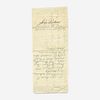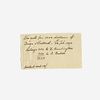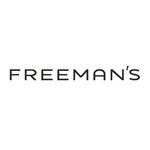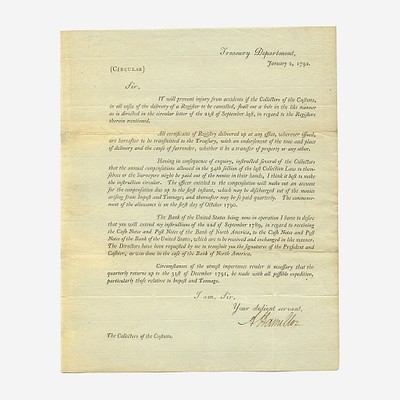[Hamilton, Alexander] [Panic of 1792] Duer, William Signed Promissory Note
About Seller
2400 Market St
Philadelphia, PA 19147
United States
Established in 1805, Freeman’s Auction House holds tradition close, with a progressive mind-set towards marketing and promotion, along with access to a team of top experts in the auction business. And now with offices in New England, the Southeast, and on the West Coast, it has never been easier to ...Read more
Two ways to bid:
- Leave a max absentee bid and the platform will bid on your behalf up to your maximum bid during the live auction.
- Bid live during the auction and your bids will be submitted real-time to the auctioneer.
Bid Increments
| Price | Bid Increment |
|---|---|
| $0 | $25 |
| $500 | $50 |
| $1,000 | $100 |
| $2,000 | $200 |
| $3,000 | $250 |
| $5,000 | $500 |
| $10,000 | $1,000 |
| $20,000 | $2,000 |
| $30,000 | $2,500 |
| $50,000 | $5,000 |
| $100,000 | $10,000 |
About Auction
Oct 25, 2021
Freeman's is honored to present The Alexander Hamilton Collection of John E. Herzog, a single-owner sale of Alexander Hamilton material, on October 25. Curated by Darren Winston, Head of the Books and Manuscripts Department. Freeman's info@freemansauction.com
- Lot Description
[Hamilton, Alexander] [Panic of 1792] Duer, William Signed Promissory Note
A promissory note portending financial ruin, signed by the man behind America's first financial crisis
New-York, February 7, 1792. One sheet, 3 1/4 x 7 3/4 in. (82 x 197 mm). Partially-printed promissory note, signed by financial speculator, William Duer, for American merchant John Pintard, for $1,000; endorsed by Pintard on verso. Engraved left side border; creasing from original folds; old cataloguer notes in pencil on verso. Lot includes a small undated MS. note acknowledging the debt as shared between an L. Huntington and J. Bedell.
A fascinating promissory note portending financial ruin, signed by financial speculator and first Assistant Secretary of the Treasury, William Duer (1743-99), to one of New York's most successful businessmen, John Pintard (1759-1844). Pintard was one of the first bankers on Wall Street to trade in securities, and this note was issued to him during the key time Duer was engaged in the rampant speculation in securities that caused America's first financial crisis, the Panic of 1792 (see lots 21, 22), that would result in Pintard's financial ruin. Pintard lost everything and was beset by creditors for years after Duer's financial swindling, eventually causing him to be sent to debtor's prison in the late 1790s. Pintard eventually took advantage of America's first bankruptcy law in 1800 to get back on good financial standing, but he never again achieved the same level of financial success as he did before the Panic. He would go on to found the New-York Historical Society in 1804.
- Shipping Info
-
No lot may be removed from Freeman’s premises until the buyer has paid in full the purchase price therefor including Buyer’s Premium or has satisfied such terms that Freeman’s, in its sole discretion, shall require. Subject to the foregoing, all Property shall be paid for and removed by the buyer at his/ her expense within ten (10) days of sale and, if not so removed, may be sold by Freeman’s, or sent by Freeman’s to a third-party storage facility, at the sole risk and charge of the buyer(s), and Freeman’s may prohibit the buyer from participating, directly or indirectly, as a bidder or buyer in any future sale or sales. In addition to other remedies available to Freeman’s by law, Freeman’s reserves the right to impose a late charge of 1.5% per month of the total purchase price on any balance remaining ten (10) days after the day of sale. If Property is not removed by the buyer within ten (10) days, a handling charge of 2% of the total purchase price per month from the tenth day after the sale until removal by the buyer shall be payable to Freeman’s by the buyer. Freeman’s will not be responsible for any loss, damage, theft, or otherwise responsible for any goods left in Freeman’s possession after ten (10) days. If the foregoing conditions or any applicable provisions of law are not complied with, in addition to other remedies available to Freeman’s and the Consignor (including without limitation the right to hold the buyer(s) liable for the bid price) Freeman’s, at its option, may either cancel the sale, retaining as liquidated damages all payments made by the buyer(s), or resell the property. In such event, the buyer(s) shall remain liable for any deficiency in the original purchase price and will also be responsible for all costs, including warehousing, the expense of the ultimate sale, and Freeman’s commission at its regular rates together with all related and incidental charges, including legal fees. Payment is a precondition to removal. Payment shall be by cash, certified check or similar bank draft, or any other method approved by Freeman’s. Checks will not be deemed to constitute payment until cleared. Any exceptions must be made upon Freeman’s written approval of credit prior to sale. In addition, a defaulting buyer will be deemed to have granted and assigned to Freeman’s, a continuing security interest of first priority in any property or money of, or owing to such buyer in Freeman’ possession, and Freeman’s may retain and apply such property or money as collateral security for the obligations due to Freeman’s. Freeman’s shall have all of the rights accorded a secured party under the Pennsylvania Uniform Commercial Code.
-
- Buyer's Premium



 EUR
EUR CAD
CAD AUD
AUD GBP
GBP MXN
MXN HKD
HKD CNY
CNY MYR
MYR SEK
SEK SGD
SGD CHF
CHF THB
THB![[Hamilton, Alexander] [Panic of 1792] Duer, William Signed Promissory Note](https://s1.img.bidsquare.com/item/l/9470/9470950.jpeg?t=1MwoER)
![[Hamilton, Alexander] [Panic of 1792] Duer, William Signed Promissory Note](https://s1.img.bidsquare.com/item/s/9470/9470950.jpeg?t=1MwoER)












